Tax Residency for Australian Expatriates: A Case Study Analysis
VerifiedAdded on 2022/12/28
|10
|2630
|1
Report
AI Summary
This report provides a comprehensive analysis of Australian taxation law, particularly concerning the tax residency of expatriates, with a detailed examination of the "Harding v Commissioner of Taxation" case. The report explores the implications of the Federal Court's rulings on the ordinary concepts test and the permanent place of abode test, crucial factors in determining an individual's tax residency status. It investigates the tax implications for Australians living and working abroad, discussing how the court's decisions impact their tax liabilities and responsibilities. The analysis covers the application of these tests, the importance of establishing a permanent place of abode, and the factors considered by the court in determining residency. The report highlights the significance of the Harding case in clarifying tax residency rules for expatriates and its broader implications for individuals working overseas. The report concludes by summarizing the key findings and the impact of the case on Australian tax law and expatriates.
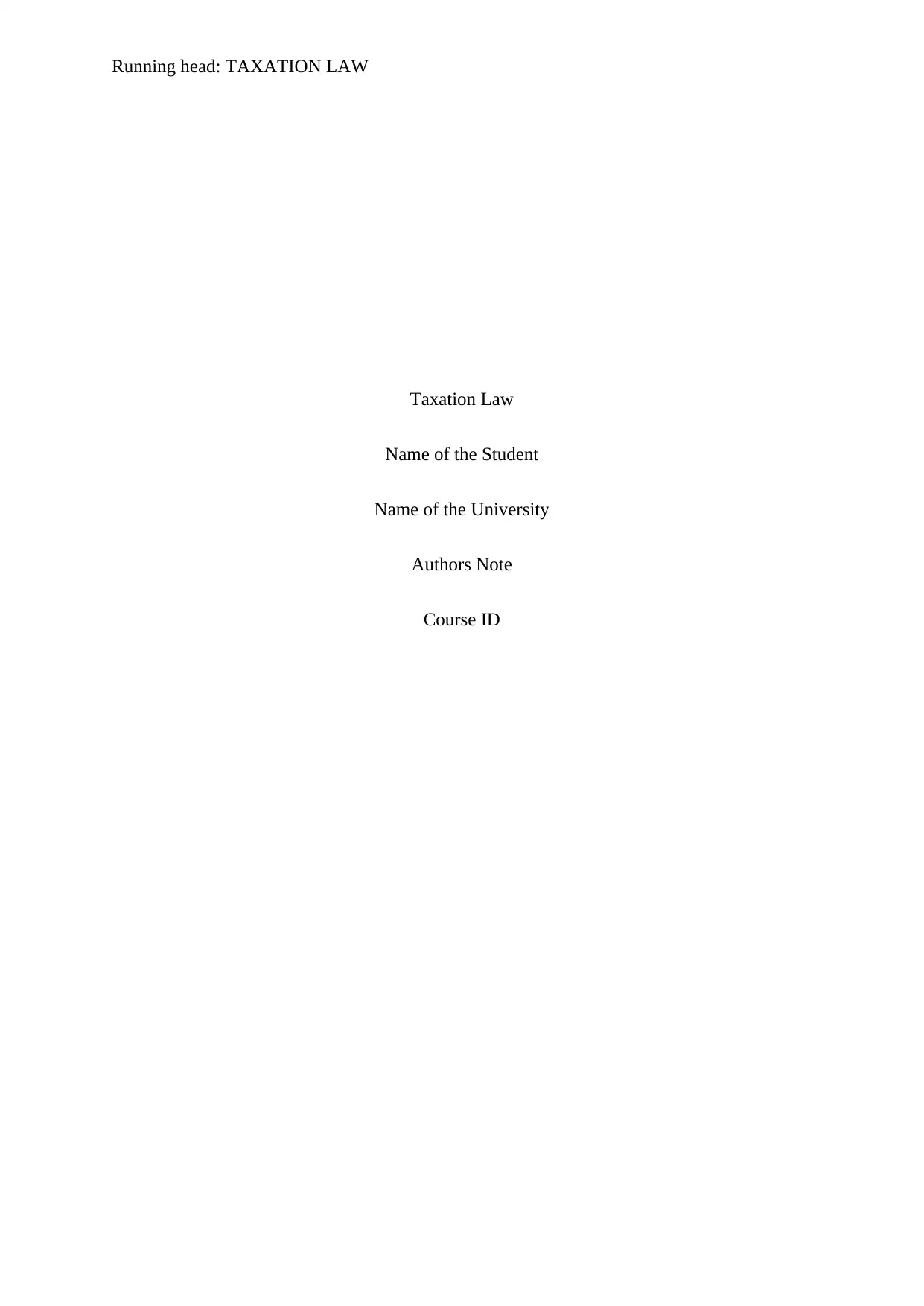
Running head: TAXATION LAW
Taxation Law
Name of the Student
Name of the University
Authors Note
Course ID
Taxation Law
Name of the Student
Name of the University
Authors Note
Course ID
Paraphrase This Document
Need a fresh take? Get an instant paraphrase of this document with our AI Paraphraser
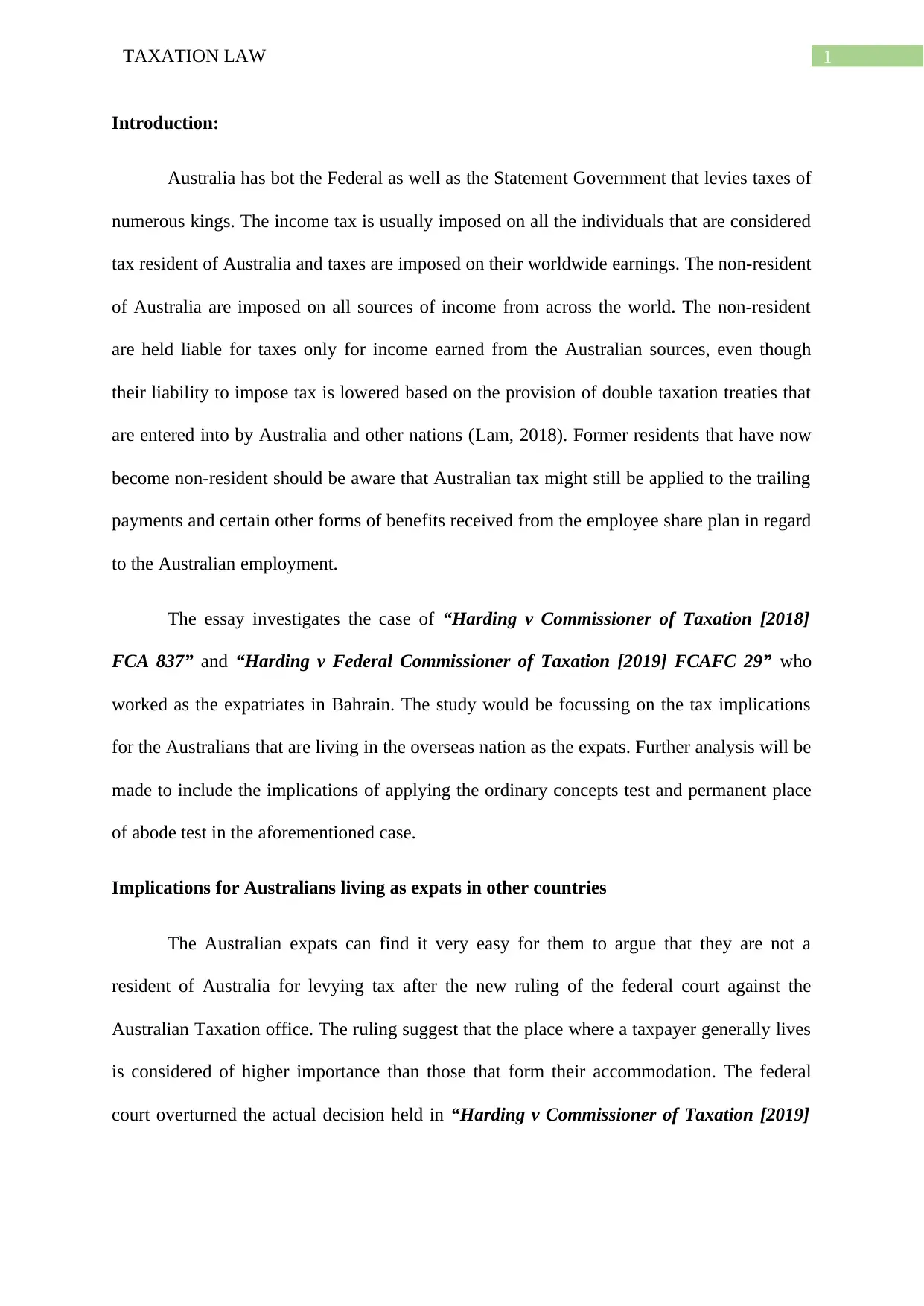
1TAXATION LAW
Introduction:
Australia has bot the Federal as well as the Statement Government that levies taxes of
numerous kings. The income tax is usually imposed on all the individuals that are considered
tax resident of Australia and taxes are imposed on their worldwide earnings. The non-resident
of Australia are imposed on all sources of income from across the world. The non-resident
are held liable for taxes only for income earned from the Australian sources, even though
their liability to impose tax is lowered based on the provision of double taxation treaties that
are entered into by Australia and other nations (Lam, 2018). Former residents that have now
become non-resident should be aware that Australian tax might still be applied to the trailing
payments and certain other forms of benefits received from the employee share plan in regard
to the Australian employment.
The essay investigates the case of “Harding v Commissioner of Taxation [2018]
FCA 837” and “Harding v Federal Commissioner of Taxation [2019] FCAFC 29” who
worked as the expatriates in Bahrain. The study would be focussing on the tax implications
for the Australians that are living in the overseas nation as the expats. Further analysis will be
made to include the implications of applying the ordinary concepts test and permanent place
of abode test in the aforementioned case.
Implications for Australians living as expats in other countries
The Australian expats can find it very easy for them to argue that they are not a
resident of Australia for levying tax after the new ruling of the federal court against the
Australian Taxation office. The ruling suggest that the place where a taxpayer generally lives
is considered of higher importance than those that form their accommodation. The federal
court overturned the actual decision held in “Harding v Commissioner of Taxation [2019]
Introduction:
Australia has bot the Federal as well as the Statement Government that levies taxes of
numerous kings. The income tax is usually imposed on all the individuals that are considered
tax resident of Australia and taxes are imposed on their worldwide earnings. The non-resident
of Australia are imposed on all sources of income from across the world. The non-resident
are held liable for taxes only for income earned from the Australian sources, even though
their liability to impose tax is lowered based on the provision of double taxation treaties that
are entered into by Australia and other nations (Lam, 2018). Former residents that have now
become non-resident should be aware that Australian tax might still be applied to the trailing
payments and certain other forms of benefits received from the employee share plan in regard
to the Australian employment.
The essay investigates the case of “Harding v Commissioner of Taxation [2018]
FCA 837” and “Harding v Federal Commissioner of Taxation [2019] FCAFC 29” who
worked as the expatriates in Bahrain. The study would be focussing on the tax implications
for the Australians that are living in the overseas nation as the expats. Further analysis will be
made to include the implications of applying the ordinary concepts test and permanent place
of abode test in the aforementioned case.
Implications for Australians living as expats in other countries
The Australian expats can find it very easy for them to argue that they are not a
resident of Australia for levying tax after the new ruling of the federal court against the
Australian Taxation office. The ruling suggest that the place where a taxpayer generally lives
is considered of higher importance than those that form their accommodation. The federal
court overturned the actual decision held in “Harding v Commissioner of Taxation [2019]
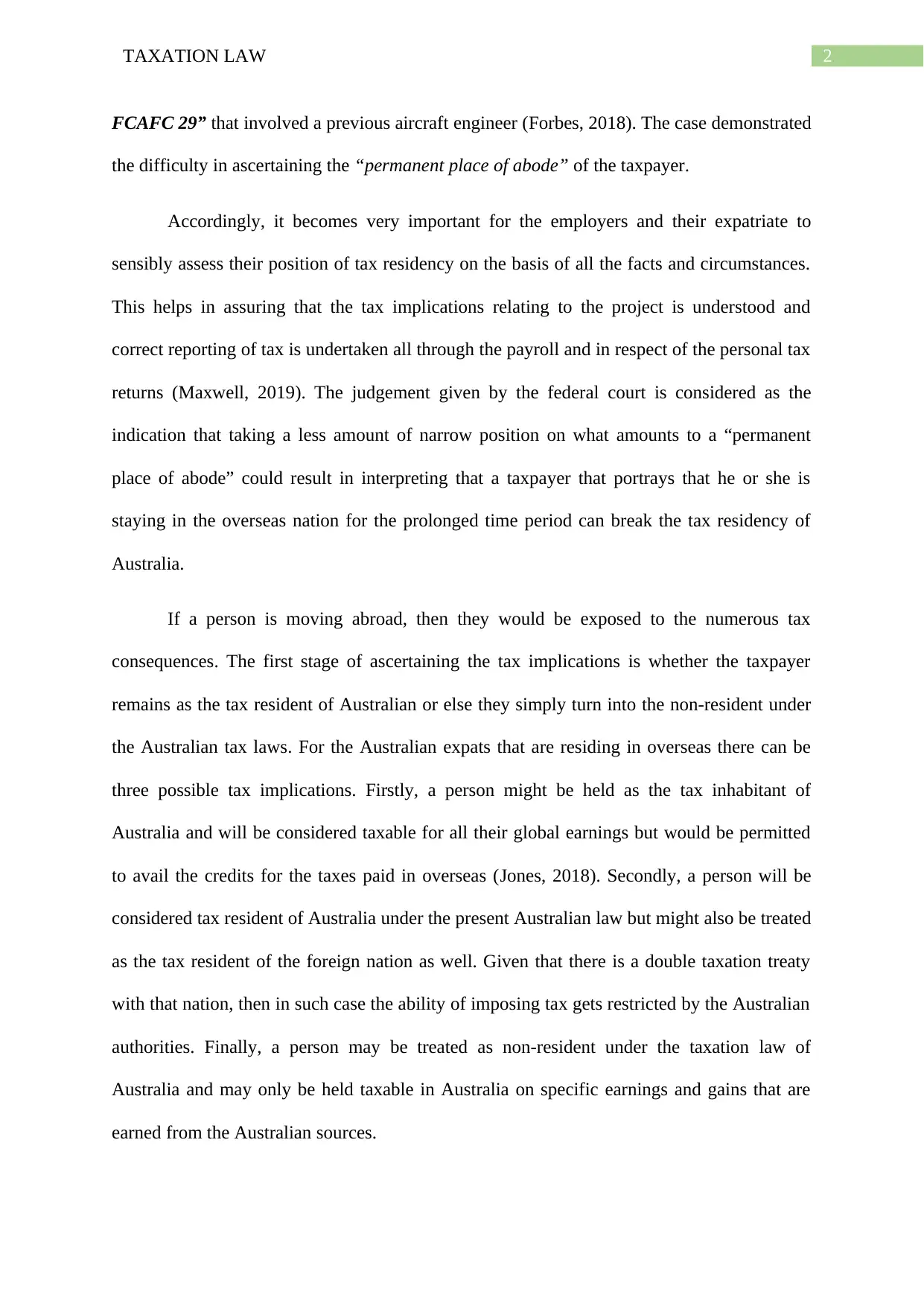
2TAXATION LAW
FCAFC 29” that involved a previous aircraft engineer (Forbes, 2018). The case demonstrated
the difficulty in ascertaining the “permanent place of abode” of the taxpayer.
Accordingly, it becomes very important for the employers and their expatriate to
sensibly assess their position of tax residency on the basis of all the facts and circumstances.
This helps in assuring that the tax implications relating to the project is understood and
correct reporting of tax is undertaken all through the payroll and in respect of the personal tax
returns (Maxwell, 2019). The judgement given by the federal court is considered as the
indication that taking a less amount of narrow position on what amounts to a “permanent
place of abode” could result in interpreting that a taxpayer that portrays that he or she is
staying in the overseas nation for the prolonged time period can break the tax residency of
Australia.
If a person is moving abroad, then they would be exposed to the numerous tax
consequences. The first stage of ascertaining the tax implications is whether the taxpayer
remains as the tax resident of Australian or else they simply turn into the non-resident under
the Australian tax laws. For the Australian expats that are residing in overseas there can be
three possible tax implications. Firstly, a person might be held as the tax inhabitant of
Australia and will be considered taxable for all their global earnings but would be permitted
to avail the credits for the taxes paid in overseas (Jones, 2018). Secondly, a person will be
considered tax resident of Australia under the present Australian law but might also be treated
as the tax resident of the foreign nation as well. Given that there is a double taxation treaty
with that nation, then in such case the ability of imposing tax gets restricted by the Australian
authorities. Finally, a person may be treated as non-resident under the taxation law of
Australia and may only be held taxable in Australia on specific earnings and gains that are
earned from the Australian sources.
FCAFC 29” that involved a previous aircraft engineer (Forbes, 2018). The case demonstrated
the difficulty in ascertaining the “permanent place of abode” of the taxpayer.
Accordingly, it becomes very important for the employers and their expatriate to
sensibly assess their position of tax residency on the basis of all the facts and circumstances.
This helps in assuring that the tax implications relating to the project is understood and
correct reporting of tax is undertaken all through the payroll and in respect of the personal tax
returns (Maxwell, 2019). The judgement given by the federal court is considered as the
indication that taking a less amount of narrow position on what amounts to a “permanent
place of abode” could result in interpreting that a taxpayer that portrays that he or she is
staying in the overseas nation for the prolonged time period can break the tax residency of
Australia.
If a person is moving abroad, then they would be exposed to the numerous tax
consequences. The first stage of ascertaining the tax implications is whether the taxpayer
remains as the tax resident of Australian or else they simply turn into the non-resident under
the Australian tax laws. For the Australian expats that are residing in overseas there can be
three possible tax implications. Firstly, a person might be held as the tax inhabitant of
Australia and will be considered taxable for all their global earnings but would be permitted
to avail the credits for the taxes paid in overseas (Jones, 2018). Secondly, a person will be
considered tax resident of Australia under the present Australian law but might also be treated
as the tax resident of the foreign nation as well. Given that there is a double taxation treaty
with that nation, then in such case the ability of imposing tax gets restricted by the Australian
authorities. Finally, a person may be treated as non-resident under the taxation law of
Australia and may only be held taxable in Australia on specific earnings and gains that are
earned from the Australian sources.
⊘ This is a preview!⊘
Do you want full access?
Subscribe today to unlock all pages.

Trusted by 1+ million students worldwide
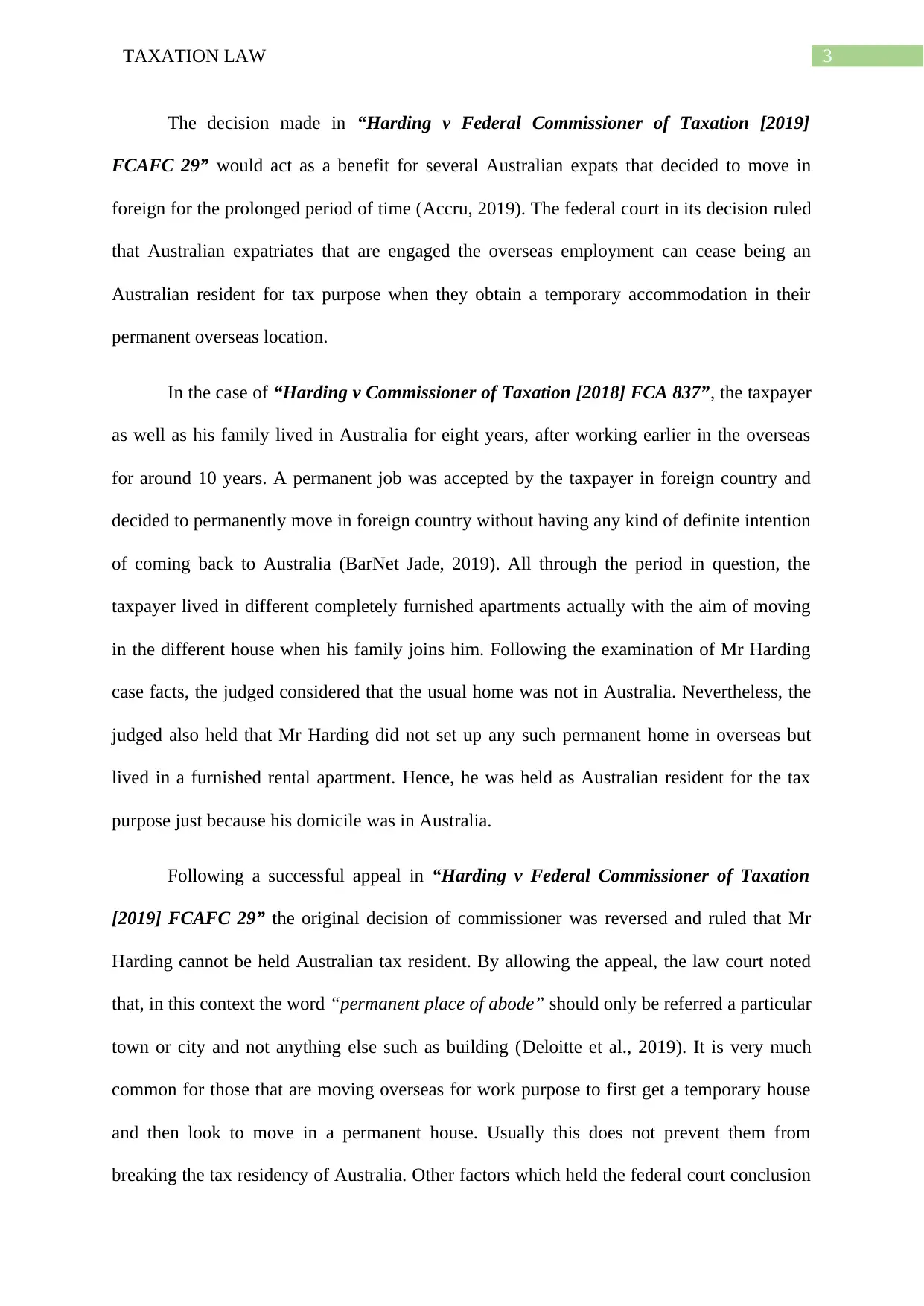
3TAXATION LAW
The decision made in “Harding v Federal Commissioner of Taxation [2019]
FCAFC 29” would act as a benefit for several Australian expats that decided to move in
foreign for the prolonged period of time (Accru, 2019). The federal court in its decision ruled
that Australian expatriates that are engaged the overseas employment can cease being an
Australian resident for tax purpose when they obtain a temporary accommodation in their
permanent overseas location.
In the case of “Harding v Commissioner of Taxation [2018] FCA 837”, the taxpayer
as well as his family lived in Australia for eight years, after working earlier in the overseas
for around 10 years. A permanent job was accepted by the taxpayer in foreign country and
decided to permanently move in foreign country without having any kind of definite intention
of coming back to Australia (BarNet Jade, 2019). All through the period in question, the
taxpayer lived in different completely furnished apartments actually with the aim of moving
in the different house when his family joins him. Following the examination of Mr Harding
case facts, the judged considered that the usual home was not in Australia. Nevertheless, the
judged also held that Mr Harding did not set up any such permanent home in overseas but
lived in a furnished rental apartment. Hence, he was held as Australian resident for the tax
purpose just because his domicile was in Australia.
Following a successful appeal in “Harding v Federal Commissioner of Taxation
[2019] FCAFC 29” the original decision of commissioner was reversed and ruled that Mr
Harding cannot be held Australian tax resident. By allowing the appeal, the law court noted
that, in this context the word “permanent place of abode” should only be referred a particular
town or city and not anything else such as building (Deloitte et al., 2019). It is very much
common for those that are moving overseas for work purpose to first get a temporary house
and then look to move in a permanent house. Usually this does not prevent them from
breaking the tax residency of Australia. Other factors which held the federal court conclusion
The decision made in “Harding v Federal Commissioner of Taxation [2019]
FCAFC 29” would act as a benefit for several Australian expats that decided to move in
foreign for the prolonged period of time (Accru, 2019). The federal court in its decision ruled
that Australian expatriates that are engaged the overseas employment can cease being an
Australian resident for tax purpose when they obtain a temporary accommodation in their
permanent overseas location.
In the case of “Harding v Commissioner of Taxation [2018] FCA 837”, the taxpayer
as well as his family lived in Australia for eight years, after working earlier in the overseas
for around 10 years. A permanent job was accepted by the taxpayer in foreign country and
decided to permanently move in foreign country without having any kind of definite intention
of coming back to Australia (BarNet Jade, 2019). All through the period in question, the
taxpayer lived in different completely furnished apartments actually with the aim of moving
in the different house when his family joins him. Following the examination of Mr Harding
case facts, the judged considered that the usual home was not in Australia. Nevertheless, the
judged also held that Mr Harding did not set up any such permanent home in overseas but
lived in a furnished rental apartment. Hence, he was held as Australian resident for the tax
purpose just because his domicile was in Australia.
Following a successful appeal in “Harding v Federal Commissioner of Taxation
[2019] FCAFC 29” the original decision of commissioner was reversed and ruled that Mr
Harding cannot be held Australian tax resident. By allowing the appeal, the law court noted
that, in this context the word “permanent place of abode” should only be referred a particular
town or city and not anything else such as building (Deloitte et al., 2019). It is very much
common for those that are moving overseas for work purpose to first get a temporary house
and then look to move in a permanent house. Usually this does not prevent them from
breaking the tax residency of Australia. Other factors which held the federal court conclusion
Paraphrase This Document
Need a fresh take? Get an instant paraphrase of this document with our AI Paraphraser
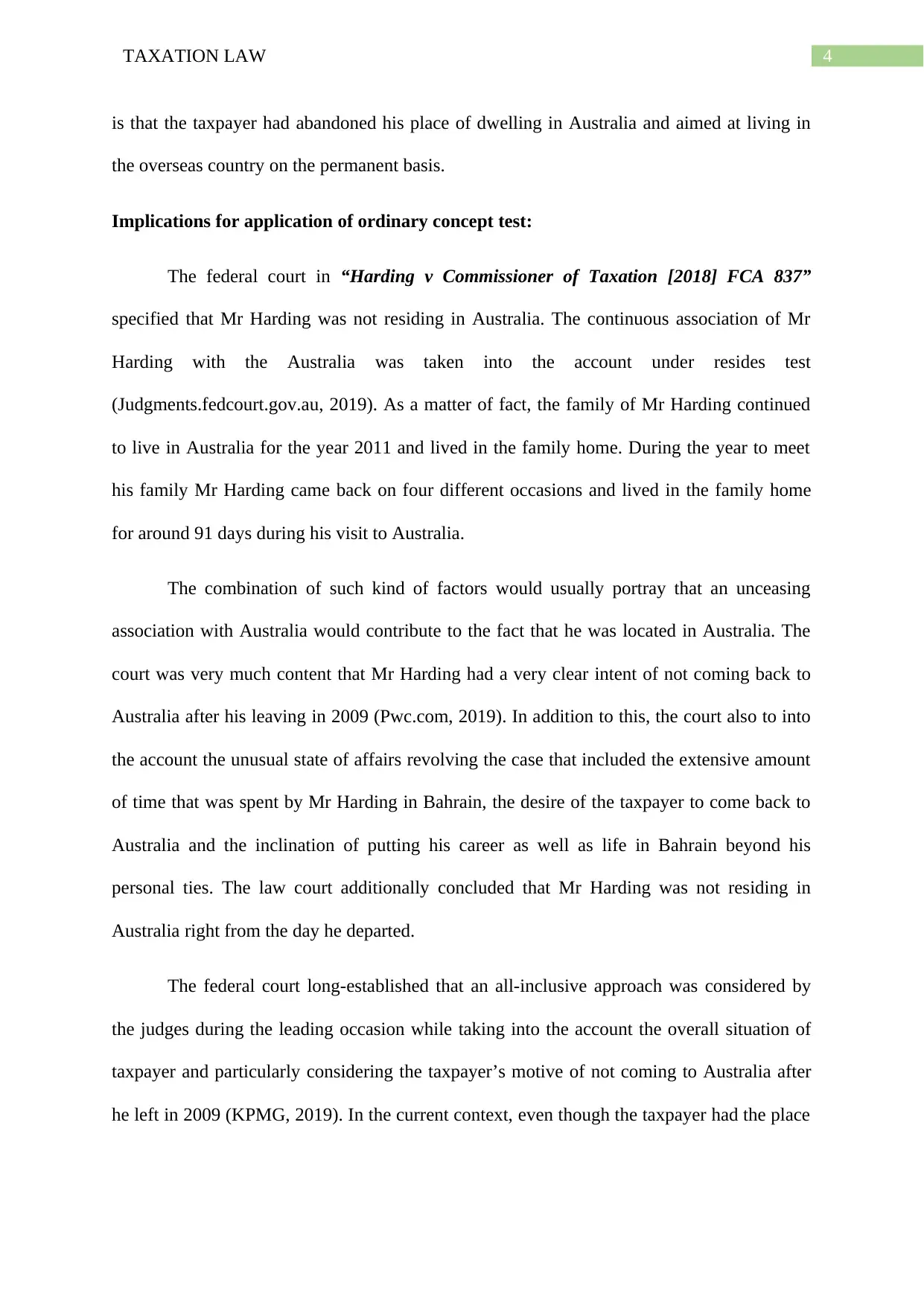
4TAXATION LAW
is that the taxpayer had abandoned his place of dwelling in Australia and aimed at living in
the overseas country on the permanent basis.
Implications for application of ordinary concept test:
The federal court in “Harding v Commissioner of Taxation [2018] FCA 837”
specified that Mr Harding was not residing in Australia. The continuous association of Mr
Harding with the Australia was taken into the account under resides test
(Judgments.fedcourt.gov.au, 2019). As a matter of fact, the family of Mr Harding continued
to live in Australia for the year 2011 and lived in the family home. During the year to meet
his family Mr Harding came back on four different occasions and lived in the family home
for around 91 days during his visit to Australia.
The combination of such kind of factors would usually portray that an unceasing
association with Australia would contribute to the fact that he was located in Australia. The
court was very much content that Mr Harding had a very clear intent of not coming back to
Australia after his leaving in 2009 (Pwc.com, 2019). In addition to this, the court also to into
the account the unusual state of affairs revolving the case that included the extensive amount
of time that was spent by Mr Harding in Bahrain, the desire of the taxpayer to come back to
Australia and the inclination of putting his career as well as life in Bahrain beyond his
personal ties. The law court additionally concluded that Mr Harding was not residing in
Australia right from the day he departed.
The federal court long-established that an all-inclusive approach was considered by
the judges during the leading occasion while taking into the account the overall situation of
taxpayer and particularly considering the taxpayer’s motive of not coming to Australia after
he left in 2009 (KPMG, 2019). In the current context, even though the taxpayer had the place
is that the taxpayer had abandoned his place of dwelling in Australia and aimed at living in
the overseas country on the permanent basis.
Implications for application of ordinary concept test:
The federal court in “Harding v Commissioner of Taxation [2018] FCA 837”
specified that Mr Harding was not residing in Australia. The continuous association of Mr
Harding with the Australia was taken into the account under resides test
(Judgments.fedcourt.gov.au, 2019). As a matter of fact, the family of Mr Harding continued
to live in Australia for the year 2011 and lived in the family home. During the year to meet
his family Mr Harding came back on four different occasions and lived in the family home
for around 91 days during his visit to Australia.
The combination of such kind of factors would usually portray that an unceasing
association with Australia would contribute to the fact that he was located in Australia. The
court was very much content that Mr Harding had a very clear intent of not coming back to
Australia after his leaving in 2009 (Pwc.com, 2019). In addition to this, the court also to into
the account the unusual state of affairs revolving the case that included the extensive amount
of time that was spent by Mr Harding in Bahrain, the desire of the taxpayer to come back to
Australia and the inclination of putting his career as well as life in Bahrain beyond his
personal ties. The law court additionally concluded that Mr Harding was not residing in
Australia right from the day he departed.
The federal court long-established that an all-inclusive approach was considered by
the judges during the leading occasion while taking into the account the overall situation of
taxpayer and particularly considering the taxpayer’s motive of not coming to Australia after
he left in 2009 (KPMG, 2019). In the current context, even though the taxpayer had the place
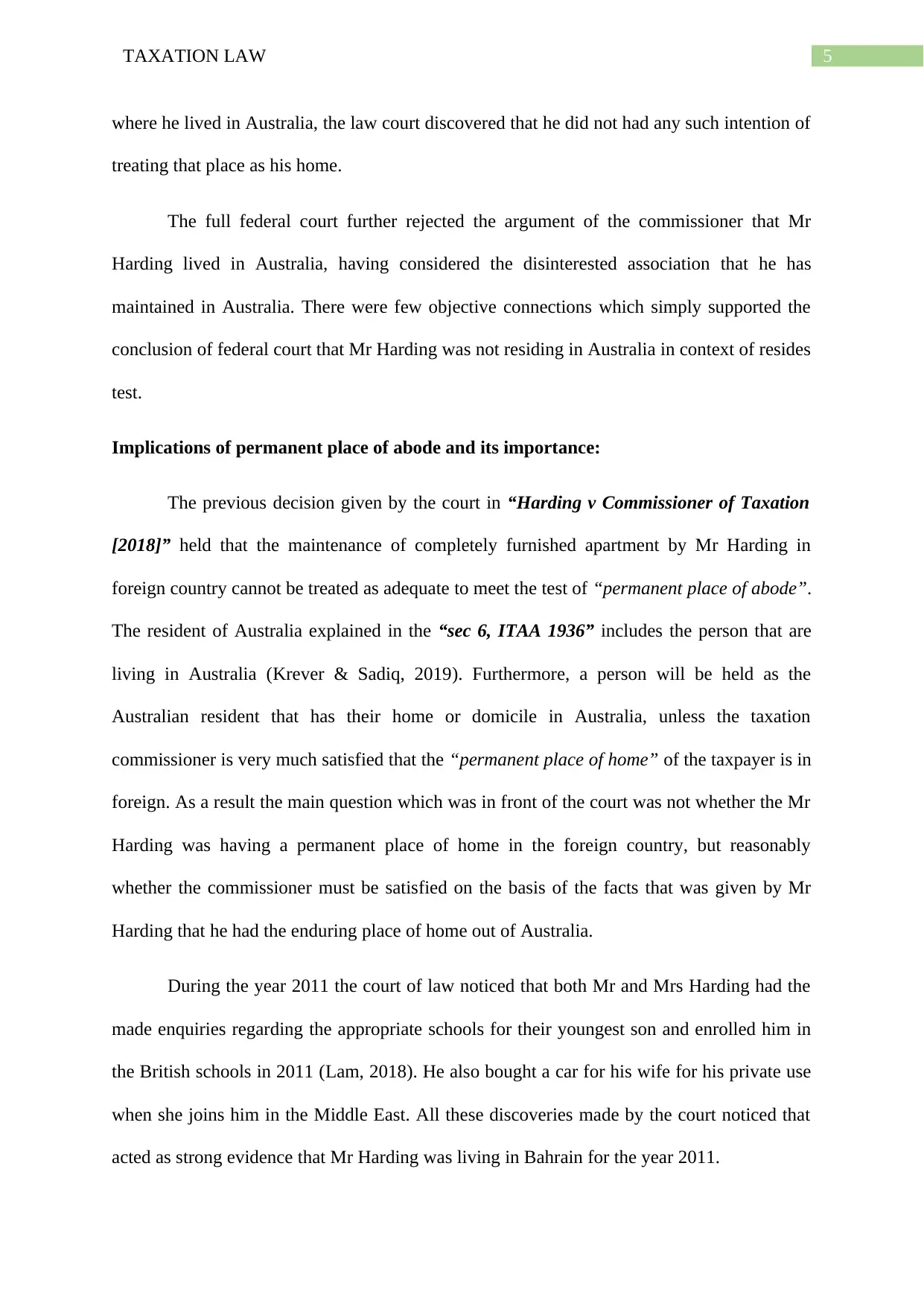
5TAXATION LAW
where he lived in Australia, the law court discovered that he did not had any such intention of
treating that place as his home.
The full federal court further rejected the argument of the commissioner that Mr
Harding lived in Australia, having considered the disinterested association that he has
maintained in Australia. There were few objective connections which simply supported the
conclusion of federal court that Mr Harding was not residing in Australia in context of resides
test.
Implications of permanent place of abode and its importance:
The previous decision given by the court in “Harding v Commissioner of Taxation
[2018]” held that the maintenance of completely furnished apartment by Mr Harding in
foreign country cannot be treated as adequate to meet the test of “permanent place of abode”.
The resident of Australia explained in the “sec 6, ITAA 1936” includes the person that are
living in Australia (Krever & Sadiq, 2019). Furthermore, a person will be held as the
Australian resident that has their home or domicile in Australia, unless the taxation
commissioner is very much satisfied that the “permanent place of home” of the taxpayer is in
foreign. As a result the main question which was in front of the court was not whether the Mr
Harding was having a permanent place of home in the foreign country, but reasonably
whether the commissioner must be satisfied on the basis of the facts that was given by Mr
Harding that he had the enduring place of home out of Australia.
During the year 2011 the court of law noticed that both Mr and Mrs Harding had the
made enquiries regarding the appropriate schools for their youngest son and enrolled him in
the British schools in 2011 (Lam, 2018). He also bought a car for his wife for his private use
when she joins him in the Middle East. All these discoveries made by the court noticed that
acted as strong evidence that Mr Harding was living in Bahrain for the year 2011.
where he lived in Australia, the law court discovered that he did not had any such intention of
treating that place as his home.
The full federal court further rejected the argument of the commissioner that Mr
Harding lived in Australia, having considered the disinterested association that he has
maintained in Australia. There were few objective connections which simply supported the
conclusion of federal court that Mr Harding was not residing in Australia in context of resides
test.
Implications of permanent place of abode and its importance:
The previous decision given by the court in “Harding v Commissioner of Taxation
[2018]” held that the maintenance of completely furnished apartment by Mr Harding in
foreign country cannot be treated as adequate to meet the test of “permanent place of abode”.
The resident of Australia explained in the “sec 6, ITAA 1936” includes the person that are
living in Australia (Krever & Sadiq, 2019). Furthermore, a person will be held as the
Australian resident that has their home or domicile in Australia, unless the taxation
commissioner is very much satisfied that the “permanent place of home” of the taxpayer is in
foreign. As a result the main question which was in front of the court was not whether the Mr
Harding was having a permanent place of home in the foreign country, but reasonably
whether the commissioner must be satisfied on the basis of the facts that was given by Mr
Harding that he had the enduring place of home out of Australia.
During the year 2011 the court of law noticed that both Mr and Mrs Harding had the
made enquiries regarding the appropriate schools for their youngest son and enrolled him in
the British schools in 2011 (Lam, 2018). He also bought a car for his wife for his private use
when she joins him in the Middle East. All these discoveries made by the court noticed that
acted as strong evidence that Mr Harding was living in Bahrain for the year 2011.
⊘ This is a preview!⊘
Do you want full access?
Subscribe today to unlock all pages.

Trusted by 1+ million students worldwide
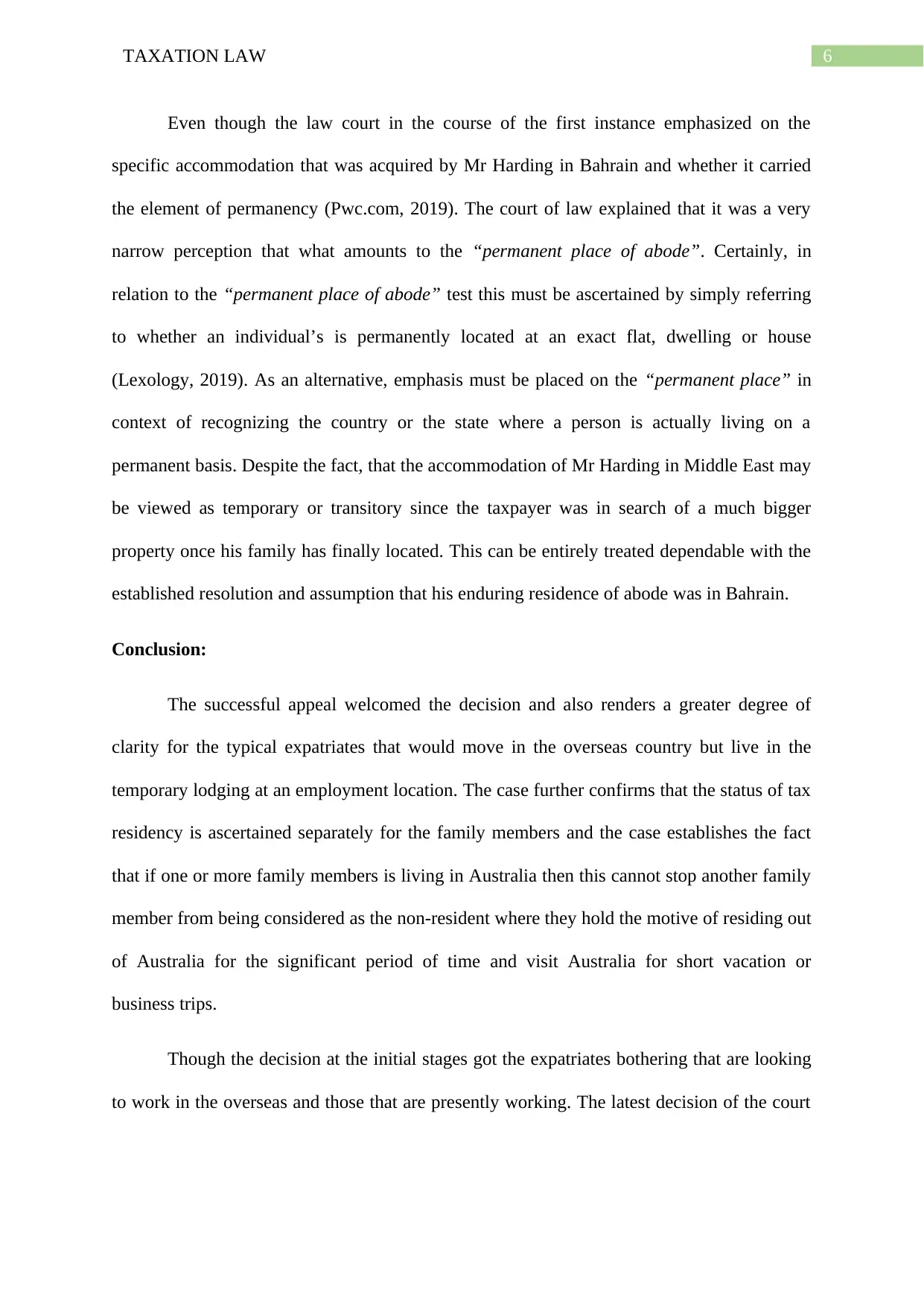
6TAXATION LAW
Even though the law court in the course of the first instance emphasized on the
specific accommodation that was acquired by Mr Harding in Bahrain and whether it carried
the element of permanency (Pwc.com, 2019). The court of law explained that it was a very
narrow perception that what amounts to the “permanent place of abode”. Certainly, in
relation to the “permanent place of abode” test this must be ascertained by simply referring
to whether an individual’s is permanently located at an exact flat, dwelling or house
(Lexology, 2019). As an alternative, emphasis must be placed on the “permanent place” in
context of recognizing the country or the state where a person is actually living on a
permanent basis. Despite the fact, that the accommodation of Mr Harding in Middle East may
be viewed as temporary or transitory since the taxpayer was in search of a much bigger
property once his family has finally located. This can be entirely treated dependable with the
established resolution and assumption that his enduring residence of abode was in Bahrain.
Conclusion:
The successful appeal welcomed the decision and also renders a greater degree of
clarity for the typical expatriates that would move in the overseas country but live in the
temporary lodging at an employment location. The case further confirms that the status of tax
residency is ascertained separately for the family members and the case establishes the fact
that if one or more family members is living in Australia then this cannot stop another family
member from being considered as the non-resident where they hold the motive of residing out
of Australia for the significant period of time and visit Australia for short vacation or
business trips.
Though the decision at the initial stages got the expatriates bothering that are looking
to work in the overseas and those that are presently working. The latest decision of the court
Even though the law court in the course of the first instance emphasized on the
specific accommodation that was acquired by Mr Harding in Bahrain and whether it carried
the element of permanency (Pwc.com, 2019). The court of law explained that it was a very
narrow perception that what amounts to the “permanent place of abode”. Certainly, in
relation to the “permanent place of abode” test this must be ascertained by simply referring
to whether an individual’s is permanently located at an exact flat, dwelling or house
(Lexology, 2019). As an alternative, emphasis must be placed on the “permanent place” in
context of recognizing the country or the state where a person is actually living on a
permanent basis. Despite the fact, that the accommodation of Mr Harding in Middle East may
be viewed as temporary or transitory since the taxpayer was in search of a much bigger
property once his family has finally located. This can be entirely treated dependable with the
established resolution and assumption that his enduring residence of abode was in Bahrain.
Conclusion:
The successful appeal welcomed the decision and also renders a greater degree of
clarity for the typical expatriates that would move in the overseas country but live in the
temporary lodging at an employment location. The case further confirms that the status of tax
residency is ascertained separately for the family members and the case establishes the fact
that if one or more family members is living in Australia then this cannot stop another family
member from being considered as the non-resident where they hold the motive of residing out
of Australia for the significant period of time and visit Australia for short vacation or
business trips.
Though the decision at the initial stages got the expatriates bothering that are looking
to work in the overseas and those that are presently working. The latest decision of the court
Paraphrase This Document
Need a fresh take? Get an instant paraphrase of this document with our AI Paraphraser

7TAXATION LAW
can be considered as the winning situation for the expatriates that are relocating overseas for
work project.
can be considered as the winning situation for the expatriates that are relocating overseas for
work project.
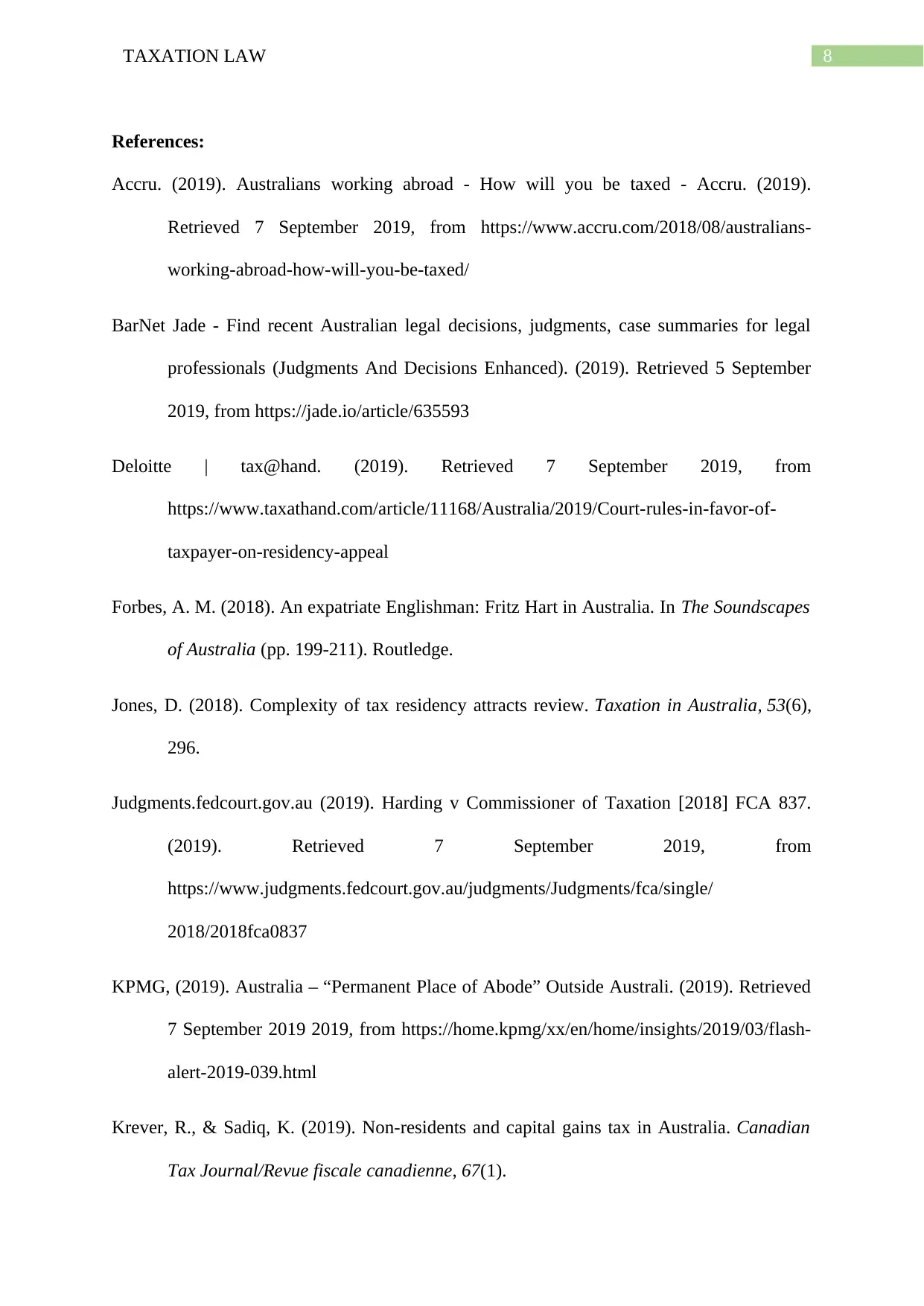
8TAXATION LAW
References:
Accru. (2019). Australians working abroad - How will you be taxed - Accru. (2019).
Retrieved 7 September 2019, from https://www.accru.com/2018/08/australians-
working-abroad-how-will-you-be-taxed/
BarNet Jade - Find recent Australian legal decisions, judgments, case summaries for legal
professionals (Judgments And Decisions Enhanced). (2019). Retrieved 5 September
2019, from https://jade.io/article/635593
Deloitte | tax@hand. (2019). Retrieved 7 September 2019, from
https://www.taxathand.com/article/11168/Australia/2019/Court-rules-in-favor-of-
taxpayer-on-residency-appeal
Forbes, A. M. (2018). An expatriate Englishman: Fritz Hart in Australia. In The Soundscapes
of Australia (pp. 199-211). Routledge.
Jones, D. (2018). Complexity of tax residency attracts review. Taxation in Australia, 53(6),
296.
Judgments.fedcourt.gov.au (2019). Harding v Commissioner of Taxation [2018] FCA 837.
(2019). Retrieved 7 September 2019, from
https://www.judgments.fedcourt.gov.au/judgments/Judgments/fca/single/
2018/2018fca0837
KPMG, (2019). Australia – “Permanent Place of Abode” Outside Australi. (2019). Retrieved
7 September 2019 2019, from https://home.kpmg/xx/en/home/insights/2019/03/flash-
alert-2019-039.html
Krever, R., & Sadiq, K. (2019). Non-residents and capital gains tax in Australia. Canadian
Tax Journal/Revue fiscale canadienne, 67(1).
References:
Accru. (2019). Australians working abroad - How will you be taxed - Accru. (2019).
Retrieved 7 September 2019, from https://www.accru.com/2018/08/australians-
working-abroad-how-will-you-be-taxed/
BarNet Jade - Find recent Australian legal decisions, judgments, case summaries for legal
professionals (Judgments And Decisions Enhanced). (2019). Retrieved 5 September
2019, from https://jade.io/article/635593
Deloitte | tax@hand. (2019). Retrieved 7 September 2019, from
https://www.taxathand.com/article/11168/Australia/2019/Court-rules-in-favor-of-
taxpayer-on-residency-appeal
Forbes, A. M. (2018). An expatriate Englishman: Fritz Hart in Australia. In The Soundscapes
of Australia (pp. 199-211). Routledge.
Jones, D. (2018). Complexity of tax residency attracts review. Taxation in Australia, 53(6),
296.
Judgments.fedcourt.gov.au (2019). Harding v Commissioner of Taxation [2018] FCA 837.
(2019). Retrieved 7 September 2019, from
https://www.judgments.fedcourt.gov.au/judgments/Judgments/fca/single/
2018/2018fca0837
KPMG, (2019). Australia – “Permanent Place of Abode” Outside Australi. (2019). Retrieved
7 September 2019 2019, from https://home.kpmg/xx/en/home/insights/2019/03/flash-
alert-2019-039.html
Krever, R., & Sadiq, K. (2019). Non-residents and capital gains tax in Australia. Canadian
Tax Journal/Revue fiscale canadienne, 67(1).
⊘ This is a preview!⊘
Do you want full access?
Subscribe today to unlock all pages.

Trusted by 1+ million students worldwide
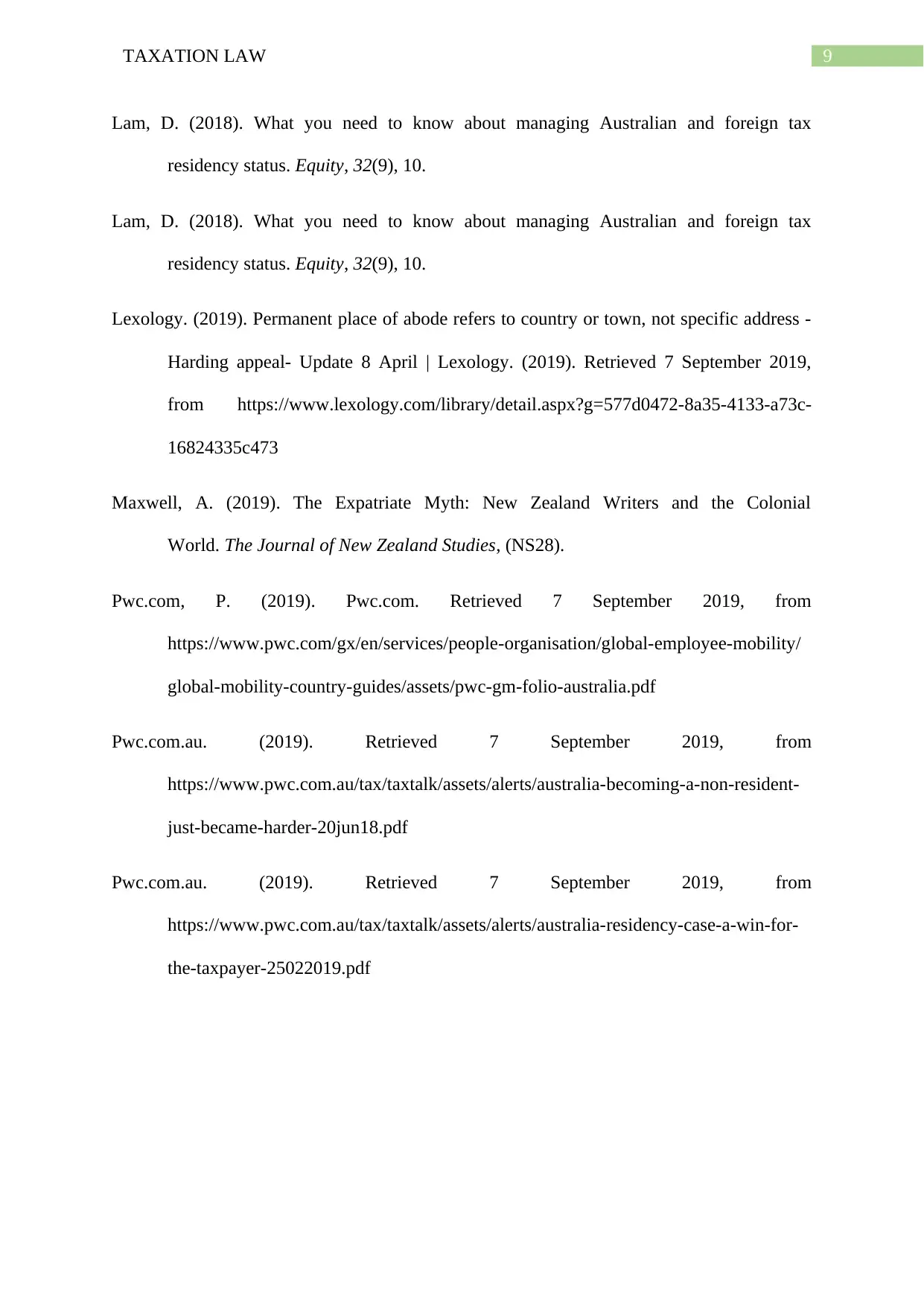
9TAXATION LAW
Lam, D. (2018). What you need to know about managing Australian and foreign tax
residency status. Equity, 32(9), 10.
Lam, D. (2018). What you need to know about managing Australian and foreign tax
residency status. Equity, 32(9), 10.
Lexology. (2019). Permanent place of abode refers to country or town, not specific address -
Harding appeal- Update 8 April | Lexology. (2019). Retrieved 7 September 2019,
from https://www.lexology.com/library/detail.aspx?g=577d0472-8a35-4133-a73c-
16824335c473
Maxwell, A. (2019). The Expatriate Myth: New Zealand Writers and the Colonial
World. The Journal of New Zealand Studies, (NS28).
Pwc.com, P. (2019). Pwc.com. Retrieved 7 September 2019, from
https://www.pwc.com/gx/en/services/people-organisation/global-employee-mobility/
global-mobility-country-guides/assets/pwc-gm-folio-australia.pdf
Pwc.com.au. (2019). Retrieved 7 September 2019, from
https://www.pwc.com.au/tax/taxtalk/assets/alerts/australia-becoming-a-non-resident-
just-became-harder-20jun18.pdf
Pwc.com.au. (2019). Retrieved 7 September 2019, from
https://www.pwc.com.au/tax/taxtalk/assets/alerts/australia-residency-case-a-win-for-
the-taxpayer-25022019.pdf
Lam, D. (2018). What you need to know about managing Australian and foreign tax
residency status. Equity, 32(9), 10.
Lam, D. (2018). What you need to know about managing Australian and foreign tax
residency status. Equity, 32(9), 10.
Lexology. (2019). Permanent place of abode refers to country or town, not specific address -
Harding appeal- Update 8 April | Lexology. (2019). Retrieved 7 September 2019,
from https://www.lexology.com/library/detail.aspx?g=577d0472-8a35-4133-a73c-
16824335c473
Maxwell, A. (2019). The Expatriate Myth: New Zealand Writers and the Colonial
World. The Journal of New Zealand Studies, (NS28).
Pwc.com, P. (2019). Pwc.com. Retrieved 7 September 2019, from
https://www.pwc.com/gx/en/services/people-organisation/global-employee-mobility/
global-mobility-country-guides/assets/pwc-gm-folio-australia.pdf
Pwc.com.au. (2019). Retrieved 7 September 2019, from
https://www.pwc.com.au/tax/taxtalk/assets/alerts/australia-becoming-a-non-resident-
just-became-harder-20jun18.pdf
Pwc.com.au. (2019). Retrieved 7 September 2019, from
https://www.pwc.com.au/tax/taxtalk/assets/alerts/australia-residency-case-a-win-for-
the-taxpayer-25022019.pdf
1 out of 10
Related Documents
Your All-in-One AI-Powered Toolkit for Academic Success.
+13062052269
info@desklib.com
Available 24*7 on WhatsApp / Email
![[object Object]](/_next/static/media/star-bottom.7253800d.svg)
Unlock your academic potential
Copyright © 2020–2026 A2Z Services. All Rights Reserved. Developed and managed by ZUCOL.





